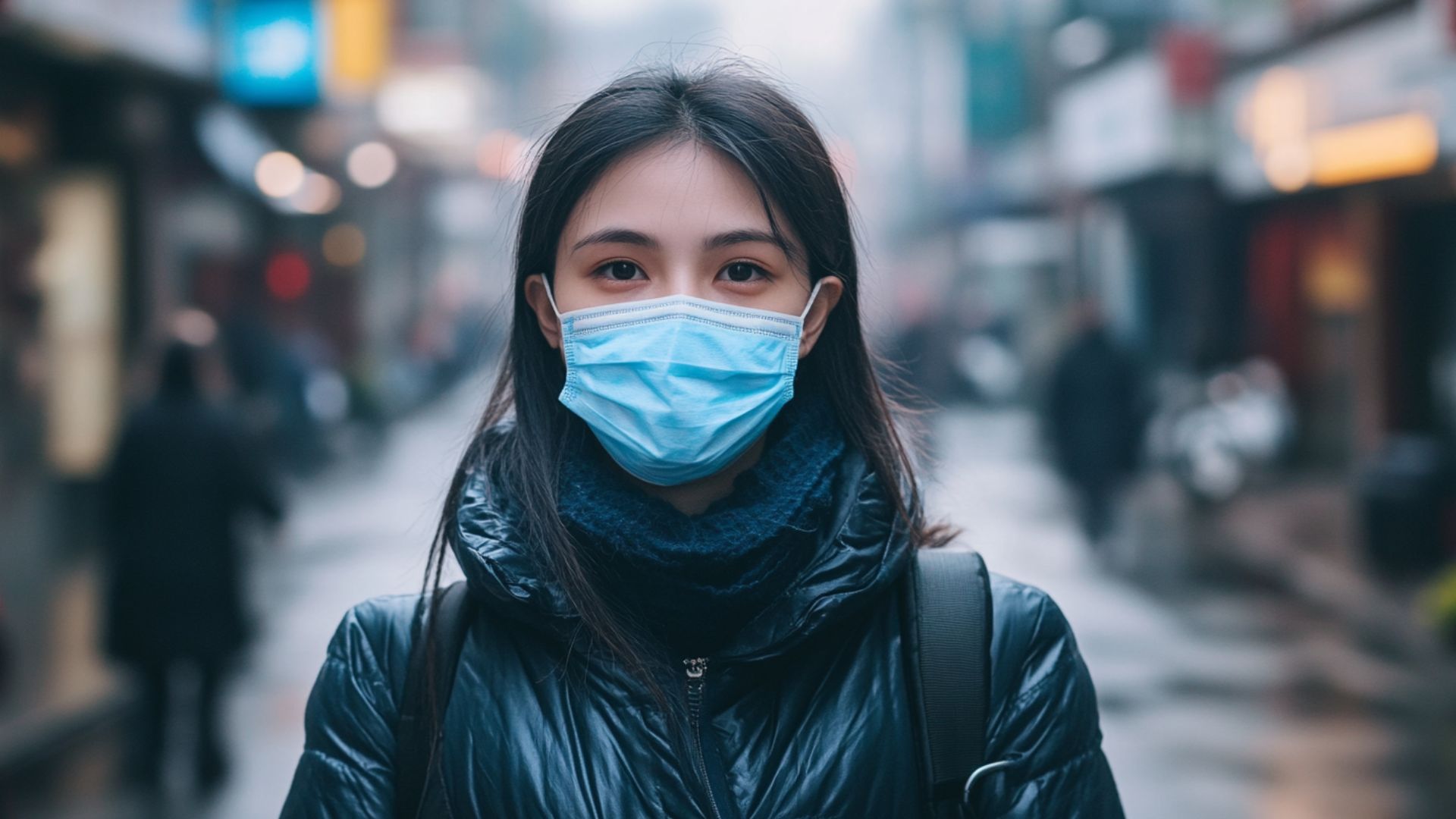Today, the question of mask-wearing’s effect on the brain remains relevant for many people. Masks help protect individuals from various diseases and infections. At the beginning of Covid-19, most people used masks for safety and public health protection. However, some studies suggest that masks can cause discomfort during extended wear. A healthy person can safely use a mask and maintain their health. However, long-term wearing may cause mild discomfort or temporary symptoms in some individuals. Adequate brain oxygenation to the brain is very important for cognitive abilities and general well-being. Reduced comfort during extended mask use can cause temporary problems.
Some people may experience mild discomfort during long-term mask use. Common experiences include slight fatigue, warmth, or temporary symptoms that resolve quickly. Long-term mask-wearing may temporarily affect concentration and cognitive clarity in sensitive individuals. In most people, oxygen levels remain completely normal during extended mask use. However, some people may experience short-term symptoms that disappear after mask removal. Research on mask use is ongoing and important for understanding physiological responses. Scientific studies and user experiences help us understand how masks affect the body. Medical professionals have established guidelines and best practices for safe mask-wearing. Following these recommendations helps maintain health and avoid discomfort.
How Prolonged Mask-Wearing May Influence Brain Function
Respiratory health plays an important role in overall human health and cognitive function. Today, mask-wearing is an effective way to protect yourself and others from many infectious diseases.
In certain institutions like laboratories and medical facilities, masks are used daily for safety. Healthcare workers and patients can maintain their health and prevent illness transmission. However, masks can sometimes cause discomfort during extended wear periods. Some people worry about oxygen levels during long-term mask use. Research shows that blood oxygen levels typically remain normal during mask wearing. Here are the potential health effects that extended mask use may cause:
- Surgical masks may cause slight breathing resistance but don’t significantly reduce blood oxygen in healthy people. For most healthy individuals, mask use doesn’t create significant discomfort or health problems. However, during very long periods, some people may notice mild symptoms.
- Prolonged use of a mask may cause mild discomfort like slight headaches or fatigue in sensitive individuals. Some people may feel warm or slightly uncomfortable after prolonged periods. Usually, masks don’t lead to serious health problems, but individual sensitivities can vary.
- Adequate brain oxygenation plays an essential role in brain function for everyone. People who have existing respiratory problems may experience more noticeable effects during extended mask use. Masks can cause slight breathing resistance and some discomfort.
- Masks create minor resistance to breathing, which some people notice as reduced airflow. This discomfort may lead to temporary effects on concentration and cognitive function. Some individuals may experience mild, temporary cognitive effects during very long mask-wearing periods.
People may experience minor issues with extended mask use, but these are typically not serious health problems. Often these effects are mild and temporary, not associated with serious medical conditions. A person may experience slight dizziness, mild headaches, or fatigue. However, masks don’t cause serious diseases or long-term health problems. Prolonged use doesn’t cause serious medical issues, only short-term symptoms that resolve quickly. Masks are required in certain institutions where they protect people from infectious diseases.
For people with serious respiratory conditions, it’s important to consult healthcare providers about mask use. It’s important to remember that respiratory health is necessary for cognitive function. Masks used appropriately are valuable tools for maintaining public health. It’s essential to use masks properly in situations that require them for safety.
The Impact of Mask-Wearing on Cognitive Function and Mental Clarity
Today, society has developed many methods to protect public health and prevent disease transmission. Masks are an integral part of many healthcare and safety protocols. Mask-wearing is important for preventing virus transmission and protecting public health. However, masks can create some minor discomfort during very long periods of use, which may temporarily affect cognitive clarity.
Masks may affect mental clarity during extended use in some sensitive individuals. Some people may experience reduced alertness and concentration during very long mask-wearing periods. Physical discomfort can include warmth around the face and slightly reduced airflow sensation. Masks may temporarily affect comfort and cause mild mental fog in some people. Healthcare professionals and researchers have conducted extensive studies on mask effects. Research shows that masks don’t cause long-term negative effects on cognitive function in healthy individuals. For healthy people, masks don’t cause serious problems except occasional temporary fatigue or mild discomfort. Slightly impaired concentration may be a temporary symptom that resolves after mask removal.
Prolonged use may reduce comfort for some individuals during long work periods. Communication difficulties, slight discomfort, and fatigue can become temporary symptoms. During stressful situations or in crowded environments, some people may experience these mild effects. Masks don’t create severe health effects, only temporary symptoms that resolve quickly. For people with breathing difficulties, there may be more noticeable effects and fatigue during extended use. However, after removing the mask, symptoms disappear and people feel normal again. While wearing masks, most people maintain normal oxygen levels in their body. Some individuals may experience very mild effects on concentration or slight fatigue. While wearing masks, it’s important to stay hydrated and take breaks when possible. Research shows that cognitive health doesn’t suffer long-term effects, and people remain healthy with proper mask use.
Health Effects of Long-Term Mask Usage
Masks are effective tools for protecting health from various infections and viruses. They help protect the respiratory system and prevent disease transmission. However, extended mask use can have minor effects on comfort and well-being. Medical workers, laboratory technicians, researchers, and other professionals use masks regularly. In many fields, they are mandatory tools for maintaining sterility and safety. Prolonged use of a mask may have some minor effects on comfort, though serious health impacts are rare. Besides potential mild effects on comfort and breathing sensation, masks may affect skin comfort. Their use can cause slight discomfort and possible skin irritation in some people. Masks are effective protective tools, though extended use may require attention to comfort.
- Cognitive and Mental Effects. When using masks for extended periods, some people may experience temporary mild cognitive effects. Slightly decreased alertness and concentration may occur temporarily in sensitive individuals. Some people feel minor discomfort due to warmth or slightly reduced airflow sensation. Research clearly shows there are no long-term cognitive impairments from mask use. People maintain their attention, memory, and reasoning abilities during normal mask use.
- Respiratory Comfort. Masks may cause a sensation of slightly restricted airflow in some sensitive individuals. Most healthy people maintain completely normal oxygen levels during mask use. However, people with existing respiratory problems may notice more effects during prolonged use. During physical activity, some individuals may experience slightly reduced comfort or mild breathlessness. There may also be temporary increased anxiety in some sensitive people.
- Skin and Facial Comfort. Another consideration may be skin irritation or redness from extended mask contact. Masks directly contact facial skin and can create a warm, humid environment. After extended periods, some people may experience dryness or moisture on their skin. Masks can contribute to acne or contact dermatitis in susceptible individuals. People who have had skin sensitivities may experience irritation from friction. The nose, chin, and cheek areas may develop minor irritation from extended mask contact.
- Hydration and Comfort. An important consideration with mask-wearing is maintaining proper hydration. Some people may drink less water while wearing masks, leading to mild dehydration. Masks can contribute to dehydration, which may cause mild fatigue or reduced concentration. Reduced fluid intake can lead to mild dizziness or temporary fatigue. Maintaining proper hydration and taking breaks can help prevent these minor effects.
- Fatigue and Communication. Fatigue and communication difficulties can occur with extended mask use. Some people experience communication challenges due to muffled speech while wearing masks. Masks can make verbal interaction slightly more difficult and tiring. Extended mask-wearing may cause these effects, especially during physically demanding work. People may feel mild fatigue during extended periods of mask use.
Balancing Safety and Comfort in Mask-Wearing
Masks play a key role in protecting health and preventing disease transmission in many settings worldwide. Their use helps improve safety, sterility, and public health protection. Masks are essential tools for reducing the risk of many infectious diseases. However, extended use may cause minor discomfort that should be managed appropriately. There are situations when masks are indispensable and essential for safety. For maintaining both safety and comfort, proper mask use requires attention to individual needs. Here are situations where masks are particularly important and helpful:
- Medical and Surgical Settings. Surgical masks are mandatory for surgeons and healthcare workers during procedures. They are used to maintain sterility and safety during medical procedures where contamination prevention is critical. Medical-grade masks are designed to minimize breathing resistance while providing protection. They may cause minor changes in breathing sensation but are generally well-tolerated. Masks may cause temporary mild discomfort that typically resolves with time and adaptation.
Prolonged Use Considerations. Extended use of masks during physical exertion may increase discomfort for some individuals. For most healthy people, masks don’t pose serious health risks during normal activities. However, they may cause minor effects like dry mouth, mild fatigue, or slight headaches during very long periods. In workplace settings requiring sterility and safety, workers must use appropriate masks. People working in various industries often use masks for safety and protection. Regular breaks and access to fresh air can help maintain comfort during extended use.













I've given up... the stress her office staff has put me through is just not worth it. You can do so much better, please clean house, either change out your office staff, or find a way for them to be more efficient please. You have to do something. This is not how you want to run your practice. It leaves a very bad impression on your business.
Please, leave your review
Write a comment: